外研八下Module 5 Cartoons Unit 3 Language in use 课件(希沃版+PPT版)
文档属性
| 名称 | 外研八下Module 5 Cartoons Unit 3 Language in use 课件(希沃版+PPT版) |

|
|
| 格式 | zip | ||
| 文件大小 | 88.9MB | ||
| 资源类型 | 试卷 | ||
| 版本资源 | 外研版 | ||
| 科目 | 英语 | ||
| 更新时间 | 2024-06-19 21:16:11 | ||
图片预览


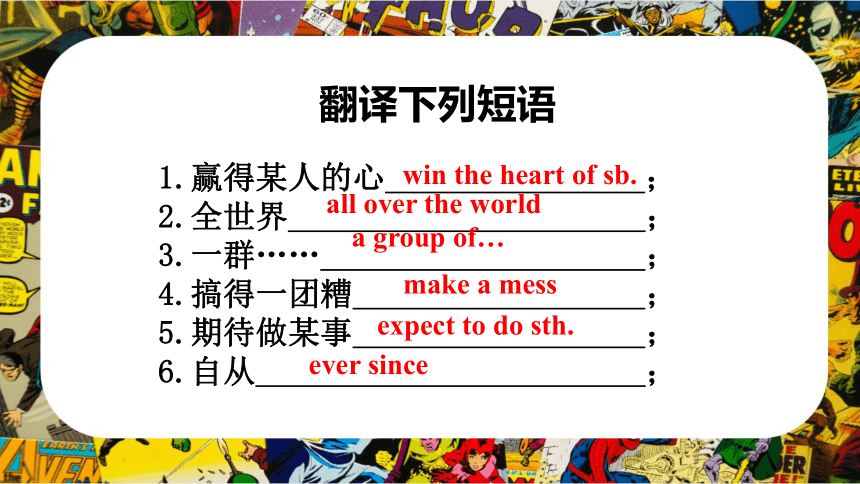
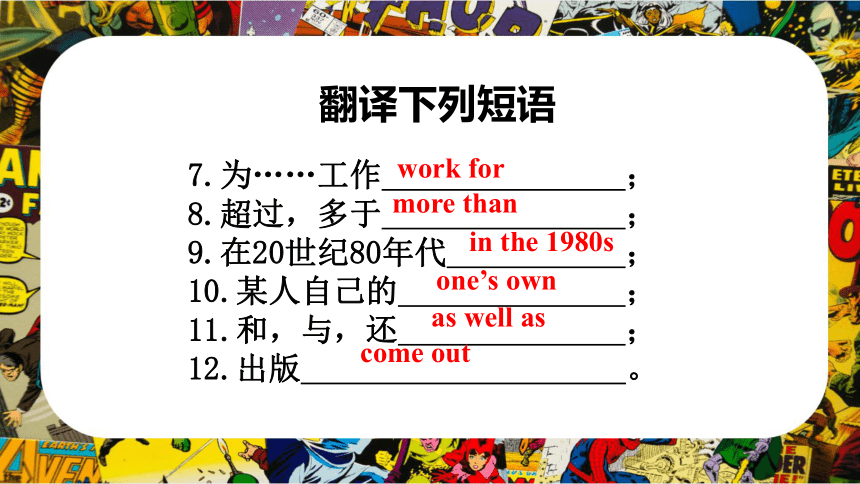

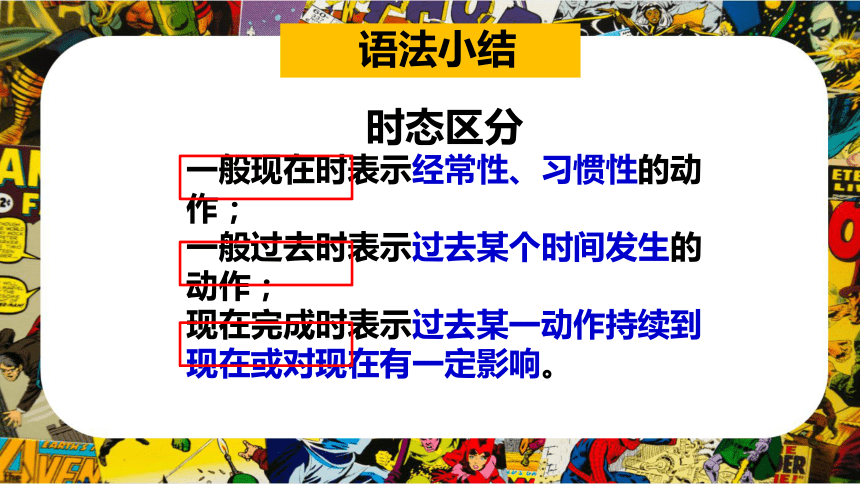
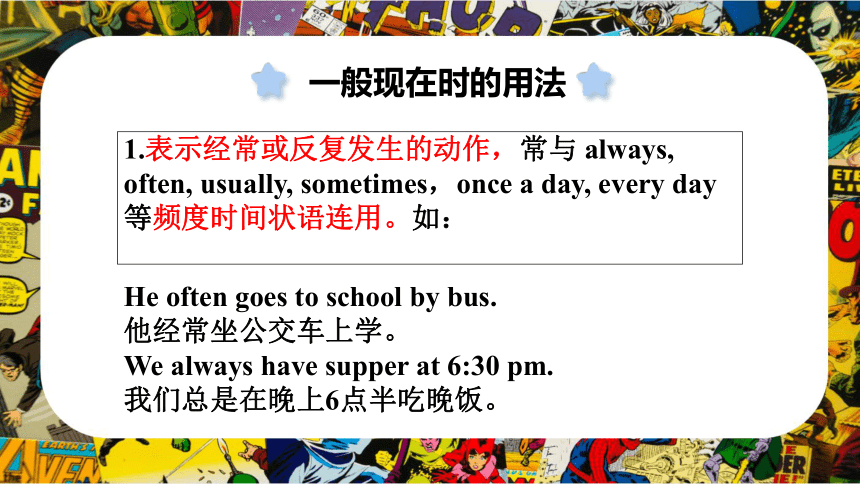




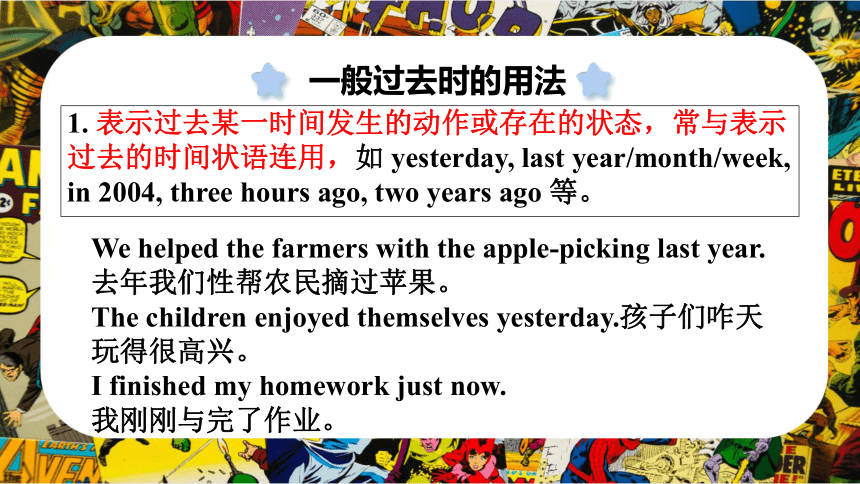
文档简介
(共46张PPT)
Module 5
Cartoons
Module 5
Cartoons
Module 5
Cartoons
Unit 3 language in use
1.向上爬,攀登 ;
2.想成为…… ;
3.一直/不断做某事 ;
4.忍不住做某事 ;
5.向……学习 ;
6.嘲笑…… 。
laugh at…
climb up
want to be…
keep doing sth.
can’t help doing sth.
learn from
翻译下列短语
1.赢得某人的心 ;
2.全世界 ;
3.一群…… ;
4.搞得一团糟 ;
5.期待做某事 ;
6.自从 ;
win the heart of sb.
all over the world
a group of…
make a mess
expect to do sth.
ever since
翻译下列短语
7.为……工作 ;
8.超过,多于 ;
9.在20世纪80年代 ;
10.某人自己的 ;
11.和,与,还 ;
12.出版 。
come out
work for
more than
in the 1980s
one’s own
as well as
翻译下列短语
Language practice
He has been popular for over eighty years.
Tintin appeared in China in the 1980s.
Snoopy lives in his own private world.
语法小结
时态区分
一般现在时表示经常性、习惯性的动作;
一般过去时表示过去某个时间发生的动作;
现在完成时表示过去某一动作持续到现在或对现在有一定影响。
1.表示经常或反复发生的动作,常与 always, often, usually, sometimes,once a day, every day等频度时间状语连用。如:
一般现在时的用法
He often goes to school by bus.
他经常坐公交车上学。
We always have supper at 6:30 pm.
我们总是在晚上6点半吃晚饭。
2. 表示现在的状态、特征、能力和感觉。这类动词有be, love,like,hate, want, hope, need, prefer, wish, know, look, sound, taste, have 等。如:
He is very happy.他很幸福。(表示状态)
She looks like her father.
她看上去像她爸爸。(表示特征)
He knows not only English, but also French.
他不仅懂英语,而且懂法语。(表示能力)
How do you like the film
你觉得这个电影怎么样?(表示感觉)
3. 表示客观真理、科学事实和客观存在。如:
The sun rises in the east. 太阳从东方升起。
Light travels faster than sound. 光速比声速快。
4.表示天气、时间、旅程、籍贯等情况。如:
—What’s the weather like today 今天天气如何?
— It’s windy. 今天有风。
—Where are you from 你是哪里人?
—I’m from Shanghai. 我是上海人。
在时间状语从句和条件状语从句中,用一般现在时表示将来。如:
If it rains tomorrow, we’ll stay at home.
如果明天下雨,我们就呆在家里。
We won’t begin the class until our teacher arrives.
直到老师来,我们才开始上课。
特别提示
表示已决定或计划要做的事,或按自然规律会发生的事。常用于这类情况的动词有 come, go, start, begin, leave, return, arrive,stop, close 等,此时用一般现在时表示将来。如:
Her father leaves for America next week.
她父亲下周动身去美国。
When does the train arrive 火车儿点到?
Tomorrow is Tuesday. 明天是星期二.
1. 表示过去某一时间发生的动作或存在的状态,常与表示过去的时间状语连用,如 yesterday, last year/month/week, in 2004, three hours ago, two years ago 等。
一般过去时的用法
We helped the farmers with the apple-picking last year.
去年我们性帮农民摘过苹果。
The children enjoyed themselves yesterday.孩子们咋天玩得很高兴。
I finished my homework just now.
我刚刚与完了作业。
2. 表示过去经常或反复发生的动作,也可以用used to do表示,常和often, always等 表示频度
的时间状语连用。如:
Tom often went to work by bus last year.
去年汤姆常常坐公交车去上班。
My father used to smoke.
我父亲过去常常抽烟。
He was always ready to help the people in trouble.
他时刻准备着帮助有困难的人。
3. 有时动作发生的时间不是很清楚,但确实是过去发生的,应当用一般过去时。如:
Who broke the teapot 谁打碎了茶壶?
Hi, Lucy! I didn't know you were here.
嗨,露西!我不知道你在这儿。
4. 在时间或条件状语从句中,用一般过去时表示“过去将来的”动作。如:
He would let me know if he got information.
他一得到信息就会让我知道。
The man jumped off the train as soon as it stopped.
火车一停,这个人就跳了下来。
He promised to buy me a dress when he went abroad the next week.
他许诺下周出国时 给我买条连衣裙。
1.强调过去的动作对现在的影响,往往具有因果关系,常与already, yet等副词 连用。如:
现在完成时的用法
She has already bought a computer.
她已经买了 电脑。
He has not found a job yet.
他还没有找到工作。
The Greens have gone to England.
格林一家已经去了英国。
2.表示过去某一动作一直持续至今,常与for, since等引导的时间状语连用。如:
I have been in Beijing for five years.
我已经在北呆了 5 年了。
He has lived here since he moved here.
从他搬到这儿以来就一直住在这里。
3.表示经历或经验,常与ever, never, once,twice, before等副词连用。如:
—Have you ever been to Shanghai
你去过上海吗?
—I have been there twice.
我去过那里两次了。
have (has) been to 与 have (has) gone to 的区别
have (has) been to表示“去过,到过”某个地方,但现在人已不在那里,常与ever, never, often, once, twice 等连用:have (has) gone to 意思是“去了”,人可能在途中或已经在那里。如:
Have you ever been to Shanghai
你去过上海吗?(人不在上海)
He has gone to Shanghai.他已经去上海了。
(人在上海或在去上海的途中)
特别提示
for与since的区别
for表示“经过多久”,多与完成时连用,后接时间段。如:
She has stayed here for half an hour.
她已经在这儿采了半个小时了。
since表示从过去某一时间一直到现在,并仍在继续。如:
Mr Li has kept this painting since 1950.
自1950年以来,李先生一直保存着这幅画。
当句子的时间状语是“for + 一段时间”或使用how long对肯定句提问时,不能使用短暂性动词,因为短暂性动词不能持续,也就不能和表示一段时间的状语连用。遇到短暂性动词要把它变成相应的延续性动词。如:
Tom borrowed the book a week ago.
— Tom has kept the book for a week.
常见的短暂性动词和延续性动词的对应表:
1. 现在完成时和一般过去时都表示在过去完成的动作。但现在完成时强调的这 一动作与现在的关系。如对现在产生的结果或影响等,而一般过去时只表示动作在过去某一时刻发生,不表示和现在的关系。试比较:
a. I have lost my new book.
我把新书丢了。(现在还未找到)
b. I lost my new book yesterday.
我昨天把新书丢了。(昨天丢的,现在找到与否没说明。)
现在完成时与一般过去时的区别
2. 侧重点不同。现在完成时侧重于现在的结果,而一般过去时侧重于动作发生的时间。
a. I have seen the film.
我看过这部电影。(现在我仍记得电影的内容)
I saw the film three days ago.
三天前我看了这部电影。 (强调是三天前,而不是别的什么时候看的电影)
b. He has been in the League for three years.
他入团已经三年了。
c. Tom wrote a letter to his parents last night.
昨晚汤姆给他的父母写了封信。
3. 两种时态的区分
(1)一般过去时的谓语动词用过去式,而现在完成时的谓语基本构成是“助动词 have /has +过去分词”。
(2) 时间状语不同。一般过去时则常与yesterday, just now, in 2002,“段时间+ago”, “last+段时间”等表示过去时间的状语连用;
而现在完成时则常与just, already, yet, ever,
never, before等副词以及和these days,
this week, “for+段时间”,“since+过去时间/从句”或“since+过去时间+ago”等时间状语连用。
1. He _________ (be) popular for over eighty years.
2. Tintin __________ (appear) in China in the 1980s.
3. Snoopy ______ (live) in his own private world.
4.We _____________ (finish) our homework.
5. He ______ (keep) fighting bad people.
6. We _________ (watch) Superman yesterday.
7. They ______ (look) very different, but both of them
__________ (win) the hearts of young people.
8. They always _______ (expect) to see more Monkey
King cartoons.
9. Fans _____________ (buy) about 200 million copies of
Tintin’s stories in more than fifty languages.
has been
appeared
lives
have finished
keeps
用括号里所给的词的适当形式完成句子。
watched
look
have won
expect
have bought
Daming: Hi, Tony. What are you reading
Tony: The Adventures of Tintin. It’s fantastic. (1) ____
you __________(ever read) a Tintin book
Daming: No, I (2) _______________ (never read) a Tintin
story. (3) _____ (be) they popular
Tony: Yes, they (4) __________ (be) popular for more
than eighty years. The first Tintin story
(5) ________ (appear) in 1929.
Daming: What does Tintin do
Tony: He (6) _______ (work) for a newspaper and he (7)
______ (have) lots of exciting experiences.
Daming: And (8) _____ the stories ______ (have) happy endings
Tony: Oh, yes, they always do.
Daming: Sounds great! Do you mind if I borrow your book
Have
have never read
Are
have been
appeared
1 Complete the conversation with the correct form
of the words in brackets.
ever read
works
has
do
have
When I was young, I (1) _________ (not like) green vegetables. The only vegetable I (2) ____ (eat) was potatoes. I was quite small and not very strong, so I was not very good at sport. Then when I (3) _____________ (watch) television one day I saw the cartoon Popeye. When Popeye stands next to the bad man, Bluto, he (4) _____ (look) small and weak, and when they fight,
didn’t like
ate
was watching
2 Complete the passage with the correct form of the words in brackets.
looks
he always (5) ____ (lose). Then he eats some green vegetables. His arms (6) _____ (grow) thicker. He becomes stronger and he wins his fights. The next day I was going to play football at school, so I asked my mother for some green vegetables. I (7) ______ (score) three times and we won the match! I (8) _________ (love) green vegetables ever since.
loses
grow
scored
have loved
Many people love cartoons because they are great fun. Parents and children (1) _____ together as the Monkey King makes a terrible (2) _____ or Shrek, the (3) _____ green man, sings a song. Cartoon heroes often live in a(n) (4) _______ world of their (5) _____. Artists (6) _______ good cartoon heroes as well as bad people. The heroes always win, and their stories (7) ______ us and help us feel safe.
ugly
mess
laugh
create laugh mess own private satisfy ugly
3 Complete the passage with the words in the box.
own
private
create
satisfy
4
2
3
1
4 Work in pairs and number the pictures in the
correct order.
Now listen and check.
Why does Betty not think the cartoon is funny at first
2 Why does Tony think the cartoon is really clever
Because she does not understand it at first.
Because the policeman could catch the man in the lift, but he doesn’t. They both just stand there, waiting for the lift to stop!
5 Listen again and answer the questions.
When you’re listening, do not stop paying attention when you hear a word you do not know. Keeping listening. The word might not be important, or the speaker may say something to explain its meaning.
Learning to learn
1906
The first cartoon film was about ______________.
In the film, the faces ___________________.
They ______________.
3 A small dog ________________________.
came to life
humorous faces
smiled
jumped through a ring
6 Read the passage and complete the sentences.
1920s
Walt Disney started to _____________ in the 1920s.
A Mickey Mouse film was the first cartoon film _____________ to become really popular.
make films
with sound
Today and in the future
Cartoon films are still popular with _________________________.
They will probably be popular for ____________ years in the future.
People of all ages
many more
Around the world
Classic American cartoons:Batman and Spiderman
Batman and Spiderman are two of the most famous American cartoons. Batman is older than Spiderman. The first Batman cartoon appeared in 1939. Batman is one of the few cartoon heroes to appear in books continuously since 1940.
Spiderman was created a lot later. He first appeared in 1962. In 1977 he appeared in daily newspaper. The Spiderman cartoon has been seen in over 500 different newspaper around the world. People have also made films based on Batman and Spiderman.
Talk about your favourite cartoons and decide
on the kinds of cartoon hero you would like to create.
Talk about developing the heroes.
What are they like
What do they look like
What do they do
How will they win people’s hearts
Decide who will write the story and who will do the
drawings.
7 Work in groups. Plan your cartoon.
Module task : Making a cartoon
Plan your story. How many different pictures will
you need to tell the story
Write the story first and decide how it will be
presented with the drawings.
Make some drawings. Use a computer, if you like.
Put the finished drawings and the story together
and present them on large pieces of paper.
8 Make your cartoon.
9 Show your cartoon to your classmates.
1. It ______ not healthy to watch TV too long.
A. is B. are C. was D. were
2. ---- How long ______ you ______ this book
---- For two weeks.
A. did; borrow B. have; borrowed C. have; kept
A
C
一、单项选择。
基础过关
3. Mother ______ me a new coat yesterday. I ____
it on. It fits me well.
A. had made; have tried B. made; have tried
C. has made; tried D. made; tried
B
基础过关
基础过关
4. I have _______ for two days. I want to ask for
two days’ leave.
A. ill B. been ill C. feel ill
5. ---- What______ the noise, Bill
---- Sorry, I broke my glass.
A. is B. was C. has been D. will be
6. He ______ me English last year.
A. teach B. taught C. teached D. is teaching
B
B
B
基础过关
7. Since 2000, Jingmen has become a new city.
Everything _________.
A. is changed B. was changed
C. had changed D. has changed
8. I don’t know if Jack _______. If he ______, call
me, please.
A. comes; come B. will come; will come
C. will come; comes
D
C
基础过关
二、同义句转换。
1. My father came back the day before yesterday.
My father has _____ _____ for two days.
2. My uncle bought the new car two months ago.
My uncle has _____ the new car _____ two months.
3. The film began ten minutes ago.
The film _____ _____ ____ for ten minutes.
4. The old man died 5 years ago.
The old man _____ ______ _______ for 5 years.
been back
had for
has been on
has been dead
基础过关
1. 抄写单词,每个5遍,每个短语3遍,意思一遍。
2. 读熟U1的对话, U2的短文,记住本节课所学单词和短语和句型。
3. 完成本模块练习册所有的作业。
Homework
Thank you !
Thank you !
Thank you !
Module 5
Cartoons
Module 5
Cartoons
Module 5
Cartoons
Unit 3 language in use
1.向上爬,攀登 ;
2.想成为…… ;
3.一直/不断做某事 ;
4.忍不住做某事 ;
5.向……学习 ;
6.嘲笑…… 。
laugh at…
climb up
want to be…
keep doing sth.
can’t help doing sth.
learn from
翻译下列短语
1.赢得某人的心 ;
2.全世界 ;
3.一群…… ;
4.搞得一团糟 ;
5.期待做某事 ;
6.自从 ;
win the heart of sb.
all over the world
a group of…
make a mess
expect to do sth.
ever since
翻译下列短语
7.为……工作 ;
8.超过,多于 ;
9.在20世纪80年代 ;
10.某人自己的 ;
11.和,与,还 ;
12.出版 。
come out
work for
more than
in the 1980s
one’s own
as well as
翻译下列短语
Language practice
He has been popular for over eighty years.
Tintin appeared in China in the 1980s.
Snoopy lives in his own private world.
语法小结
时态区分
一般现在时表示经常性、习惯性的动作;
一般过去时表示过去某个时间发生的动作;
现在完成时表示过去某一动作持续到现在或对现在有一定影响。
1.表示经常或反复发生的动作,常与 always, often, usually, sometimes,once a day, every day等频度时间状语连用。如:
一般现在时的用法
He often goes to school by bus.
他经常坐公交车上学。
We always have supper at 6:30 pm.
我们总是在晚上6点半吃晚饭。
2. 表示现在的状态、特征、能力和感觉。这类动词有be, love,like,hate, want, hope, need, prefer, wish, know, look, sound, taste, have 等。如:
He is very happy.他很幸福。(表示状态)
She looks like her father.
她看上去像她爸爸。(表示特征)
He knows not only English, but also French.
他不仅懂英语,而且懂法语。(表示能力)
How do you like the film
你觉得这个电影怎么样?(表示感觉)
3. 表示客观真理、科学事实和客观存在。如:
The sun rises in the east. 太阳从东方升起。
Light travels faster than sound. 光速比声速快。
4.表示天气、时间、旅程、籍贯等情况。如:
—What’s the weather like today 今天天气如何?
— It’s windy. 今天有风。
—Where are you from 你是哪里人?
—I’m from Shanghai. 我是上海人。
在时间状语从句和条件状语从句中,用一般现在时表示将来。如:
If it rains tomorrow, we’ll stay at home.
如果明天下雨,我们就呆在家里。
We won’t begin the class until our teacher arrives.
直到老师来,我们才开始上课。
特别提示
表示已决定或计划要做的事,或按自然规律会发生的事。常用于这类情况的动词有 come, go, start, begin, leave, return, arrive,stop, close 等,此时用一般现在时表示将来。如:
Her father leaves for America next week.
她父亲下周动身去美国。
When does the train arrive 火车儿点到?
Tomorrow is Tuesday. 明天是星期二.
1. 表示过去某一时间发生的动作或存在的状态,常与表示过去的时间状语连用,如 yesterday, last year/month/week, in 2004, three hours ago, two years ago 等。
一般过去时的用法
We helped the farmers with the apple-picking last year.
去年我们性帮农民摘过苹果。
The children enjoyed themselves yesterday.孩子们咋天玩得很高兴。
I finished my homework just now.
我刚刚与完了作业。
2. 表示过去经常或反复发生的动作,也可以用used to do表示,常和often, always等 表示频度
的时间状语连用。如:
Tom often went to work by bus last year.
去年汤姆常常坐公交车去上班。
My father used to smoke.
我父亲过去常常抽烟。
He was always ready to help the people in trouble.
他时刻准备着帮助有困难的人。
3. 有时动作发生的时间不是很清楚,但确实是过去发生的,应当用一般过去时。如:
Who broke the teapot 谁打碎了茶壶?
Hi, Lucy! I didn't know you were here.
嗨,露西!我不知道你在这儿。
4. 在时间或条件状语从句中,用一般过去时表示“过去将来的”动作。如:
He would let me know if he got information.
他一得到信息就会让我知道。
The man jumped off the train as soon as it stopped.
火车一停,这个人就跳了下来。
He promised to buy me a dress when he went abroad the next week.
他许诺下周出国时 给我买条连衣裙。
1.强调过去的动作对现在的影响,往往具有因果关系,常与already, yet等副词 连用。如:
现在完成时的用法
She has already bought a computer.
她已经买了 电脑。
He has not found a job yet.
他还没有找到工作。
The Greens have gone to England.
格林一家已经去了英国。
2.表示过去某一动作一直持续至今,常与for, since等引导的时间状语连用。如:
I have been in Beijing for five years.
我已经在北呆了 5 年了。
He has lived here since he moved here.
从他搬到这儿以来就一直住在这里。
3.表示经历或经验,常与ever, never, once,twice, before等副词连用。如:
—Have you ever been to Shanghai
你去过上海吗?
—I have been there twice.
我去过那里两次了。
have (has) been to 与 have (has) gone to 的区别
have (has) been to表示“去过,到过”某个地方,但现在人已不在那里,常与ever, never, often, once, twice 等连用:have (has) gone to 意思是“去了”,人可能在途中或已经在那里。如:
Have you ever been to Shanghai
你去过上海吗?(人不在上海)
He has gone to Shanghai.他已经去上海了。
(人在上海或在去上海的途中)
特别提示
for与since的区别
for表示“经过多久”,多与完成时连用,后接时间段。如:
She has stayed here for half an hour.
她已经在这儿采了半个小时了。
since表示从过去某一时间一直到现在,并仍在继续。如:
Mr Li has kept this painting since 1950.
自1950年以来,李先生一直保存着这幅画。
当句子的时间状语是“for + 一段时间”或使用how long对肯定句提问时,不能使用短暂性动词,因为短暂性动词不能持续,也就不能和表示一段时间的状语连用。遇到短暂性动词要把它变成相应的延续性动词。如:
Tom borrowed the book a week ago.
— Tom has kept the book for a week.
常见的短暂性动词和延续性动词的对应表:
1. 现在完成时和一般过去时都表示在过去完成的动作。但现在完成时强调的这 一动作与现在的关系。如对现在产生的结果或影响等,而一般过去时只表示动作在过去某一时刻发生,不表示和现在的关系。试比较:
a. I have lost my new book.
我把新书丢了。(现在还未找到)
b. I lost my new book yesterday.
我昨天把新书丢了。(昨天丢的,现在找到与否没说明。)
现在完成时与一般过去时的区别
2. 侧重点不同。现在完成时侧重于现在的结果,而一般过去时侧重于动作发生的时间。
a. I have seen the film.
我看过这部电影。(现在我仍记得电影的内容)
I saw the film three days ago.
三天前我看了这部电影。 (强调是三天前,而不是别的什么时候看的电影)
b. He has been in the League for three years.
他入团已经三年了。
c. Tom wrote a letter to his parents last night.
昨晚汤姆给他的父母写了封信。
3. 两种时态的区分
(1)一般过去时的谓语动词用过去式,而现在完成时的谓语基本构成是“助动词 have /has +过去分词”。
(2) 时间状语不同。一般过去时则常与yesterday, just now, in 2002,“段时间+ago”, “last+段时间”等表示过去时间的状语连用;
而现在完成时则常与just, already, yet, ever,
never, before等副词以及和these days,
this week, “for+段时间”,“since+过去时间/从句”或“since+过去时间+ago”等时间状语连用。
1. He _________ (be) popular for over eighty years.
2. Tintin __________ (appear) in China in the 1980s.
3. Snoopy ______ (live) in his own private world.
4.We _____________ (finish) our homework.
5. He ______ (keep) fighting bad people.
6. We _________ (watch) Superman yesterday.
7. They ______ (look) very different, but both of them
__________ (win) the hearts of young people.
8. They always _______ (expect) to see more Monkey
King cartoons.
9. Fans _____________ (buy) about 200 million copies of
Tintin’s stories in more than fifty languages.
has been
appeared
lives
have finished
keeps
用括号里所给的词的适当形式完成句子。
watched
look
have won
expect
have bought
Daming: Hi, Tony. What are you reading
Tony: The Adventures of Tintin. It’s fantastic. (1) ____
you __________(ever read) a Tintin book
Daming: No, I (2) _______________ (never read) a Tintin
story. (3) _____ (be) they popular
Tony: Yes, they (4) __________ (be) popular for more
than eighty years. The first Tintin story
(5) ________ (appear) in 1929.
Daming: What does Tintin do
Tony: He (6) _______ (work) for a newspaper and he (7)
______ (have) lots of exciting experiences.
Daming: And (8) _____ the stories ______ (have) happy endings
Tony: Oh, yes, they always do.
Daming: Sounds great! Do you mind if I borrow your book
Have
have never read
Are
have been
appeared
1 Complete the conversation with the correct form
of the words in brackets.
ever read
works
has
do
have
When I was young, I (1) _________ (not like) green vegetables. The only vegetable I (2) ____ (eat) was potatoes. I was quite small and not very strong, so I was not very good at sport. Then when I (3) _____________ (watch) television one day I saw the cartoon Popeye. When Popeye stands next to the bad man, Bluto, he (4) _____ (look) small and weak, and when they fight,
didn’t like
ate
was watching
2 Complete the passage with the correct form of the words in brackets.
looks
he always (5) ____ (lose). Then he eats some green vegetables. His arms (6) _____ (grow) thicker. He becomes stronger and he wins his fights. The next day I was going to play football at school, so I asked my mother for some green vegetables. I (7) ______ (score) three times and we won the match! I (8) _________ (love) green vegetables ever since.
loses
grow
scored
have loved
Many people love cartoons because they are great fun. Parents and children (1) _____ together as the Monkey King makes a terrible (2) _____ or Shrek, the (3) _____ green man, sings a song. Cartoon heroes often live in a(n) (4) _______ world of their (5) _____. Artists (6) _______ good cartoon heroes as well as bad people. The heroes always win, and their stories (7) ______ us and help us feel safe.
ugly
mess
laugh
create laugh mess own private satisfy ugly
3 Complete the passage with the words in the box.
own
private
create
satisfy
4
2
3
1
4 Work in pairs and number the pictures in the
correct order.
Now listen and check.
Why does Betty not think the cartoon is funny at first
2 Why does Tony think the cartoon is really clever
Because she does not understand it at first.
Because the policeman could catch the man in the lift, but he doesn’t. They both just stand there, waiting for the lift to stop!
5 Listen again and answer the questions.
When you’re listening, do not stop paying attention when you hear a word you do not know. Keeping listening. The word might not be important, or the speaker may say something to explain its meaning.
Learning to learn
1906
The first cartoon film was about ______________.
In the film, the faces ___________________.
They ______________.
3 A small dog ________________________.
came to life
humorous faces
smiled
jumped through a ring
6 Read the passage and complete the sentences.
1920s
Walt Disney started to _____________ in the 1920s.
A Mickey Mouse film was the first cartoon film _____________ to become really popular.
make films
with sound
Today and in the future
Cartoon films are still popular with _________________________.
They will probably be popular for ____________ years in the future.
People of all ages
many more
Around the world
Classic American cartoons:Batman and Spiderman
Batman and Spiderman are two of the most famous American cartoons. Batman is older than Spiderman. The first Batman cartoon appeared in 1939. Batman is one of the few cartoon heroes to appear in books continuously since 1940.
Spiderman was created a lot later. He first appeared in 1962. In 1977 he appeared in daily newspaper. The Spiderman cartoon has been seen in over 500 different newspaper around the world. People have also made films based on Batman and Spiderman.
Talk about your favourite cartoons and decide
on the kinds of cartoon hero you would like to create.
Talk about developing the heroes.
What are they like
What do they look like
What do they do
How will they win people’s hearts
Decide who will write the story and who will do the
drawings.
7 Work in groups. Plan your cartoon.
Module task : Making a cartoon
Plan your story. How many different pictures will
you need to tell the story
Write the story first and decide how it will be
presented with the drawings.
Make some drawings. Use a computer, if you like.
Put the finished drawings and the story together
and present them on large pieces of paper.
8 Make your cartoon.
9 Show your cartoon to your classmates.
1. It ______ not healthy to watch TV too long.
A. is B. are C. was D. were
2. ---- How long ______ you ______ this book
---- For two weeks.
A. did; borrow B. have; borrowed C. have; kept
A
C
一、单项选择。
基础过关
3. Mother ______ me a new coat yesterday. I ____
it on. It fits me well.
A. had made; have tried B. made; have tried
C. has made; tried D. made; tried
B
基础过关
基础过关
4. I have _______ for two days. I want to ask for
two days’ leave.
A. ill B. been ill C. feel ill
5. ---- What______ the noise, Bill
---- Sorry, I broke my glass.
A. is B. was C. has been D. will be
6. He ______ me English last year.
A. teach B. taught C. teached D. is teaching
B
B
B
基础过关
7. Since 2000, Jingmen has become a new city.
Everything _________.
A. is changed B. was changed
C. had changed D. has changed
8. I don’t know if Jack _______. If he ______, call
me, please.
A. comes; come B. will come; will come
C. will come; comes
D
C
基础过关
二、同义句转换。
1. My father came back the day before yesterday.
My father has _____ _____ for two days.
2. My uncle bought the new car two months ago.
My uncle has _____ the new car _____ two months.
3. The film began ten minutes ago.
The film _____ _____ ____ for ten minutes.
4. The old man died 5 years ago.
The old man _____ ______ _______ for 5 years.
been back
had for
has been on
has been dead
基础过关
1. 抄写单词,每个5遍,每个短语3遍,意思一遍。
2. 读熟U1的对话, U2的短文,记住本节课所学单词和短语和句型。
3. 完成本模块练习册所有的作业。
Homework
Thank you !
Thank you !
Thank you !
同课章节目录
- Module 1 Feelings and impressions
- Unit 1 It smells delicious.
- Unit 2 I feel nervous when I speak Chinese .
- Unit 3 Language in use
- Module 2 Experiences
- Unit 1 I've also entered lots of speaking competi
- Unit 2 They have seen the Pyramids.
- Unit 3 Language in use
- Module 3 Journey to space
- Unit 1 Has it arrived yet?
- Unit 2 We have not found life on any other planet
- Unit 3 Language in use
- Module 4 Seeing the docto
- Unit 1 I haven't done much exercise since I got m
- Unit 2 We have played football for a year now
- Unit 3 Language in use
- Module 5 Cartoons
- Unit 1 It's time to watch a cartoon.
- Unit 2 Tintin has been popular for over eighty yea
- Unit 3 Language in use
- Revision module A
- Module 6 Hobbies
- Unit 1 Do you collect anything ?
- Unit 2 Hobbies can make you grow as a person.
- Unit 3 Language in use
- Module 7 Summer in Los Angeles
- Unit 1 Please write to me and send me some photos
- Unit 2 Fill out a form and come to learn English
- Unit 3 Language in use
- Module 8 Time off
- Unit 1 I can hardly believe we are in the city ce
- Unit 2 We thought somebody was moving about
- Unit 3 Language in use
- Module 9 Friendship
- Unit 1 Could I ask if you've mentioned this to he
- Unit 2 I believe that the world is what you think
- Unit 3 Language in use
- Module 10 On the radio
- Unit 1 I hope that you can join us one day
- Unit 2 It seemed that they were speaking to me in
- Unit 3 Language in use
- Revision module B
